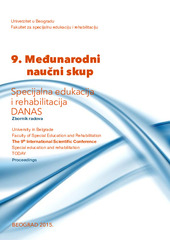Prikaz osnovnih podataka o dokumentu
Stavovi učenika tipičnog razvoja prema vršnjacima sa Daunovim sindromom
Typical development students’ attitudes towards peers with down syndrome
| dc.contributor | Vuković, Mile | |
| dc.creator | Konsuelo Talijan, Bojana | |
| dc.creator | Banković, Slobodan | |
| dc.creator | Brojčin, Branislav | |
| dc.date.accessioned | 2022-03-09T12:16:36Z | |
| dc.date.available | 2022-03-09T12:16:36Z | |
| dc.date.issued | 2015 | |
| dc.identifier.isbn | 978-86-6203-069-6 | |
| dc.identifier.uri | http://rfasper.fasper.bg.ac.rs/handle/123456789/4214 | |
| dc.description.abstract | Jedno od važnih pitanja kojim se definiše uspeh inkluzivnog obrazovanja se odnosi na prihvatanje učenika sa intelektualnom ometenošću. Cilj ovog rada je usmeren na ispitivanje stavova dece tipičnog razvoja prema vršnjacima sa Daunovim sindromom. Uzorkom je obuhvaćeno 77 učenika, uzrasta od osam do četrnaest godina, koji pohađaju redovnu osnovnu školu. U istraživanju je korišćen prvi deo Skale za procenu dečjih stavova prema Daunovom sindromu. Ovim delom instrumenta ispitani su stavovi prema različitim aspektima druženja i školovanja sa hipotetičkim detetom sa Daunovim sindromom. Viši skorovi na ovom delu skale ukazuju na negativnije stavove. Ispitanicima su verbalnim putem opisane fizičke karakteristike dece sa Daunovim sindromom uz prikazivanje odgovarajućih fotografija. Rezultati analize odgovora na pojedinačnim stavkama ukazuju na generalno pozitivne stavove u pogledu spremnosti za druženje sa vršnjacima sa Daunovim sindromom – više od 50% učenika daje pozitivne odgovore. S druge strane, više od 50% ispitanika ističe različitost u pogledu nekih akademskih aktivnosti, interesovanja i načina školovanja učenika sa Daunovim sindromom. Dalje, uočena je negativna korelacija između uzrasta ispitanika i skorova koji se odnose na spremnost za druženje sa ovom decom (r=-0,239, p=0,50). Primenom t-testa za nezavisne uzorke nisu dobijene statistički značajne razlike u odnosu na pol i razred (niži/viši) u pogledu spremnosti za druženje i školovanje sa vršnjacima sa Daunovim sindromom. U cilju pripreme učenika tipičnog razvoja za prihvatanje vršnjaka sa intelektualnom ometenošću značajno je primeniti programe indirektnog kontakta i pružiti deci informacije koje će im pomoći da uoče sličnosti između sebe i deteta sa Daunovim sindromom. | sr |
| dc.description.abstract | One of the important issue that defines the success of inclusive education is related to acceptance of students with intellectual disabilities. The aim of this study is focused on examining the attitudes of typical development children towards peers with Down syndrome. The sample included 77 students, aged from eight to fourteen years, who attend regular elementary school. In this study, we used the first part of The Children’s Attitudes towards Down Syndrome Scale. This part of the instrument was examined attitudes towards various aspects of friendships and education with the hypothetical child with Down syndrome. Higher scores on this part of the scale indicate more negative attitudes. Respondents were verbally described the physical characteristics of children with Down syndrome by showing the corresponding photos. Results of the analysis responses on individual items indicate generally positive attitudes in terms of willingness to socializing with their peers with Down syndrome – more than 50% of the students gave positive answers. On the other hand, more than 50% of respondents highlight some differences in terms of academic activities, interests and education modes of children with Down syndrome. Furthermore, there is a negative correlation between age of subjects and scores relating to a willingness to socializing with these children (r=-0,239, p=0,50). By using the t-test for independent samples were not obtained statistically significant differences in relation to gender and class (lower/higher) in terms of readiness to socializing and education with their peers with Down syndrome. In order to prepare typical development students for accepting of peers with intellectual disability it is important to implement programs of indirect contact and provide informations that will help children to notice the similarities between themselves and a child with Down syndrome. | sr |
| dc.language.iso | sr | sr |
| dc.publisher | Univerzitet u Beogradu – Fakultet za specijalnu edukaciju i rehabilitaciju/ University of Belgrade – Faculty of Special Education and Rehabilitation | sr |
| dc.relation | info:eu-repo/grantAgreement/MESTD/Basic Research (BR or ON)/179017/RS// | sr |
| dc.rights | openAccess | sr |
| dc.rights.uri | https://creativecommons.org/licenses/by-sa/4.0/ | |
| dc.source | Zbornik radova - 9. Međunarodni naučni skup „Specijalna edukacija i rehabilitacija danas“, Beograd, Srbija, 25–27.9.2015 | sr |
| dc.subject | Daunov sindrom | sr |
| dc.subject | stavovi | sr |
| dc.subject | inkluzija | sr |
| dc.subject | Down syndrome | sr |
| dc.subject | attitudes | sr |
| dc.subject | inclusion | sr |
| dc.title | Stavovi učenika tipičnog razvoja prema vršnjacima sa Daunovim sindromom | sr |
| dc.title | Typical development students’ attitudes towards peers with down syndrome | sr |
| dc.type | conferenceObject | sr |
| dc.rights.license | BY-SA | sr |
| dc.citation.epage | 247 | |
| dc.citation.spage | 241 | |
| dc.identifier.fulltext | http://rfasper.fasper.bg.ac.rs/bitstream/id/6481/Untitled29.pdf | |
| dc.identifier.rcub | https://hdl.handle.net/21.15107/rcub_rfasper_4214 | |
| dc.type.version | publishedVersion | sr |


